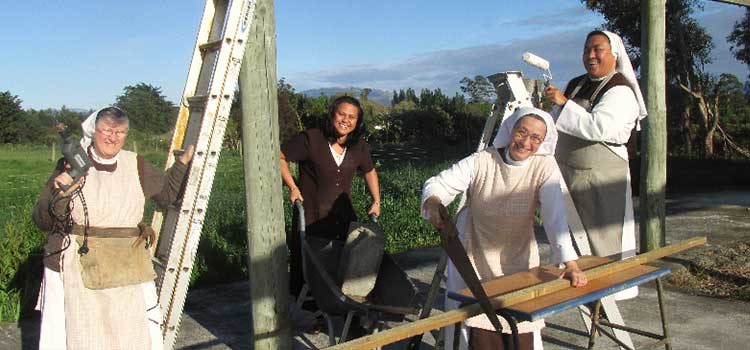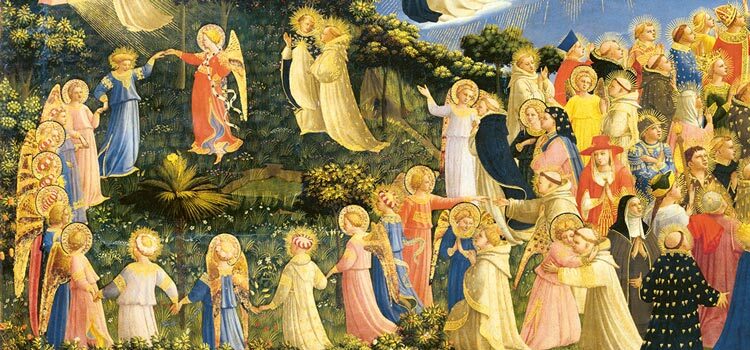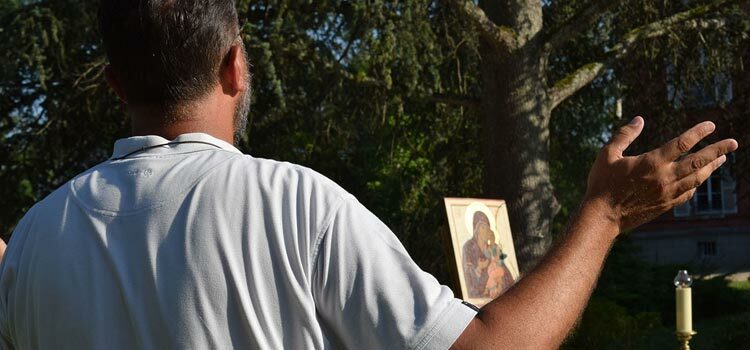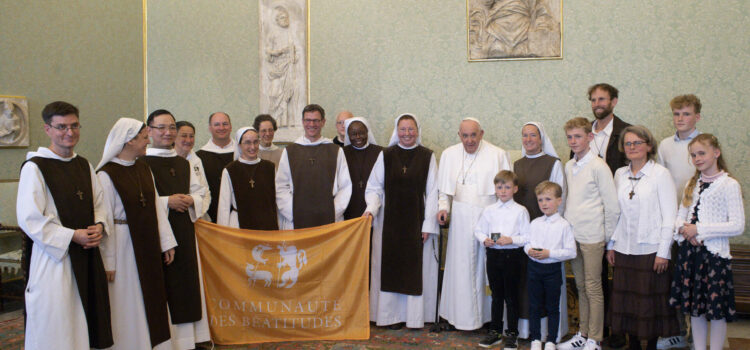Keeping in touch
« Go in the peace of Christ », Mass has ended, but one can understand: « From now, live in your everyday life what you have received ». After every moment of prayer – adoration, Divine Office, Eucharist, etc. – the moment comes to leave the temple, the holy place, Thabor, to go down and return to the secular side and worries of our every day life. How can we keep contact with God?
Although being aware of the difference between what is sacred and what is secular, Christianity brought about the revolutionary novelty of uniting those two levels of existence. The sacred invades the secular world through the incarnation of Christ: God eats, God gets dirty, God walks and moves, God gets dressed, God works, etc. What good news! God is present in our everyday life. Thus, we can keep contact with him in all circumstances. We have to remember this truth because human beings have a tendency to separate, to sort out, to keep one’s distance from God. It is like an echo of the fundamental fear mentioned in the book of Genesis « We were afraid of you and hid ourselves » (Gen. 3,10). But our God is a God of encounter and communion. He comes and seeks us out wherever we are, even in the depth of hell: « For you, I, your God, I have made myself your child, being the Lord, I assumed your slave appearance, for you, I, who am above the heavens, I descended on the earth, and even under the earth » (Early homily about the holy and great Shabbat).
In a homily given in Genoa, on May 27th 2017, Pope Francis stated : « Christian prayer is not a way to remain a little more in peace with oneself, or to find any inner harmony, we pray in order to bring everything to God, to entrust the world to Him : prayer is intercession. It is not quietness, it is charity. It means asking, searching, knocking (cf. Matt. 7,7) ».
Some spiritualities risk establishing a false difference between what is holy and what is secular and reducing orison to a search for psychological quietness or inner harmony, severed from life. The Pope reminds us that « we pray in order to bring everything to God ».
The key to keeping in touch with God at the heart of our activities is life itself. For life is the environment which allows our prayer and our contact with Him to spring forth and be fed. The one who prays is not cut off from the world but knows how to live constantly in the present moment, and find in it the presence of God, both mysterious and hidden, yet so real. In a recent letter to German Catholics (June the 29th 2019) Pope Francis writes that in order to awaken the passion for the Kingdom, to proclaim it and to carry it to the poorest, we have to « develop a spiritual taste to dwell close to the life of people, thus discovering it to be a source of higher joy ». Daily life with its worries, its difficulties, sometimes with its activism, with all its « mundane » joys is the place where this discovery of a spiritual taste, of a higher joy, is made possible. Experiencing this gives a new light to Jesus’s commandment to stay awake and pray all the time (cf. Luke 21,36) St Paul also enjoins « At every opportunity pray in the Spirit, using prayers and petitions of every kind » (Eph. 6, 18). All the time, not only during an hour of adoration, or when you are in the chapel, in the silence… At all time, which includes everything that makes up my daily life …
Keeping the fire burning
How can we keep contact with God? The answer is simple. We have to learn anew how to live our daily lives. Two attitudes help us toward this conversion: We have to nurse a spirit of wonder and search for the meaning of everything.
To nurse a spirit of wonder
The Christian philosopher Francesc Torralba, says that « Surprise is the beginning of questioning and the basis for the development of knowledge in all its facets. This necessarily requires, a questioning on the sense and origin of things, an astonishment in the face of our very existence. When all this throbs deeply in a human being, then spiritual life throbs within him ».
This ability to wonder, allows spiritual life to flourish, opens for us the door which leads into the Kingdom. It is the secret of little children: « Truly I say to you, unless you change and become like little children, you will not enter the kingdom of heaven .» (Matt. 18,3).
Search for meaning
The other attitude which allows us to keep contact with God, lies in the search of meaning in everything we do. The Jewish psychologist Victor Frankl stated that « the will to find meaning » is a basic yearning, to give meaning to life, have a meaningful existence find a reason, a motivation that is worth living for.
Francesc Torralba emphasizes that the meaning of life encompasses at least three dimensions: the meaning of the many events which make up our existence (this assumes that life, with its ups and downs, has a logic) ; the direction of our lives (that assumes the possibility of an accomplishment) ; a link with the value of life and joy.
In the many things I do all throughout the day, what is the meaning of each of my commitments? Why do I do all this? Have I really chosen to do this, even if some features of those commitments are set on me by life? Do I discern in all those events a call from God? Do I feel commissioned in my daily life?
These questions can also help me make a choice in the activities I’m involved in. If I let myself be driven by existence without finding any meaning, then my life is empty and I need urgently to pray to the Holy Spirit: « Come in to us, father of the poor, come dispenser of gifts, come, light of our hearts » (Sequence of Pentecost).
By working on these attitudes, I shall be able to keep a fire within me, a fire lit up by grace in the sacred moments I meet up with the Lord. In a logic of communion and unity, the sacred and secular spheres are not opposed but feed each other. Life is a source of spirituality and orison. At the same time, our prayer life will help us live our everyday lives with God. So, all the means which lead us to greater unity with Christ, to a greater docility to the Holy Spirit will help us make of our very lives the place where we meet God and the others.
Go in the peace of Christ!
The quotation
“Perhaps the simplicity and humility of the things of life, pacify our fears and our need for security, perhaps the prosaic nature of what is ordinary plays a part in appeasing our souls, to make us feel that we are on familiar ground, which allows God to make himself present.” Francis Martin
TO GO FURTHER…Only for todayHere are some quick and simple ways we can use:
Books
|
Find the previous articles in our “Life of prayer” series.
(publication edited by brothers and sisters of the Community of the Beatitudes – © rights reserved).






